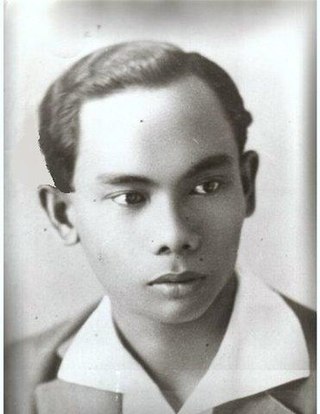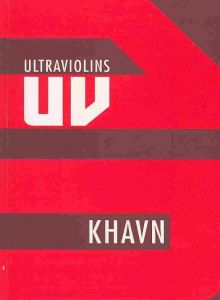
Maria Elisa Cristobal Anson-Rodrigo, better known as Boots Anson-Roa, is a Filipina actress, columnist, editor, and lecturer.
The Carlos Palanca Memorial Awards for Literature winners in the year 2001 :
The Carlos Palanca Memorial Awards for Literature winners in the year 2000 :
The Carlos Palanca Memorial Awards for Literature winners in the year 1981.
Lualhati Torres Bautista was a Filipina writer, novelist, liberal activist and political critic. Her most popular novels include Dekada '70; Bata, Bata, Pa'no Ka Ginawa?; and ‘GAPÔ.
The Carlos Palanca Memorial Awards for Literature winners in the year 1975.
The Carlos Palanca Memorial Awards for Literature winners in the year 1974.
Rene O. Villanueva was a Filipino playwright and author. He is famed for his deep involvement in theater and television and in children's literature, whether it be on television, in books or on stage.
Louie Jon Agustin Sanchez, a poet, fiction writer, critic, and journalist, hails from Flora, Apayao, Philippines. He lives in Novaliches, Caloocan, in Metro Manila.

Alfonso Discher Tagle Sr., better known as Panchito Alba or simply Panchito, was a Filipino film actor who almost exclusively appeared in comedy roles. He was known for his swarthy looks and a prominent big nose, which was often the target of ridicule, especially Dolphy calling him "baboy ramo". Panchito frequently appeared as a comedic foil to Dolphy, with whom he was best friends in real life.
Edgar Calabia Samar is a poet and novelist from San Pablo City, Philippines. He has received the Philippine National Book Awards for his novels and book of criticism, and the Palanca Awards for his poetry collections and short fiction. His novels Sa Kasunod ng 909, Si Janus Silang at ang Tiyanak ng Tabon and Si Janus Silang at ang Labanang Manananggal-Mambabarang all won the Philippine National Book Awards for Best Novel in a Philippine Language in 2012, 2015, and 2016, respectively. He has also been awarded the PBBY-Salanga Writer's Prize, the NCCA Writer's Prize for the Novel, the Gantimpalang Collantes sa Sanaysay, and the Gawad Surian sa Tula. His poetry books, Pag-aabang sa Kundiman: Isang Tulambuhay and Samantalang Sakop at Iniibig: Panibagong Tulambuhay were both nominated for the National Book Award. His award-winning children story Uuwi na ang Nanay Kong si Adarnahas been adapted into play and was staged at the Cultural Center of the Philippines as part of The Virgin Labfest in July 2008. The same story was also adapted for television in a storytelling segment of GMA-7's Art Angel episode last May 29, 2008. His book, Walong Diwata ng Pagkahulog, was recipient of the 2005 NCCA Writer's Prize; its translation to English as Eight Muses of the Fall was longlisted in the 2009 Man Asian Literary Prize. Samar is also fellow to the 2010 International Writing Program of the University of Iowa.
Alejandro G. Abadilla, commonly known as AGA, was a Filipino poet, essayist, and fiction writer. Critic Pedro Ricarte referred to Abadilla as the father of modern Philippine poetry, and was known for challenging established forms and literature's "excessive romanticism and emphasis on rhyme and meter". Abadilla helped found the Kapisanang Panitikan in 1935 and edited a magazine called Panitikan. His Ako ang Daigdig collection of poems is one of his better-known works.
"Sa Aking Mga Kabatà" is a poem about the love of one's native language written in Tagalog. It is widely attributed to the Filipino national hero José Rizal, who supposedly wrote it in 1868 at the age of eight. There is no evidence, however, to support authorship by Rizal and several historians now believe it to be a hoax. The actual author of the poem is suspected to have been the poets Gabriel Beato Francisco or Hermenegildo Cruz.

Alberto Segismundo Cruz was a Filipino poet, short story writer and novelist. Three of his novels have been published by Ateneo de Manila Press.
Ildefonso Santiago Santos (1897–1984) was a Filipino educator, poet, and linguist. Recognized as one of the finest poets in Tagalog, Santos was also renowned with his translations of Rubaiyat of Omar Khayam and of the Philippine National Anthem, and for his use of the ancient Filipino form of poetry known as Tanaga.

Khavn De La Cruz is a Filipino poet, singer, songwriter, pianist and filmmaker. He is the founder and festival director of MOV International Film, Music and Literature Festival. Considered the father of Philippine digital filmmaking, Khavn has made 47 features and 112 short films since 1994. His 46th feature, Ruined Heart, is lensed by Christopher Doyle and features Tadanobu Asano and Nathalia Acevedo. It premiered in official competition at the 27th Tokyo International Film Festival.
Lumbay ng Dila is a novel written by Filipino author Genevieve L. Asenjo published in 2010. The novel is set mainly in Antique in the Western Visayas region of the Philippines and it tells the story of Sadyah Zapanta – Lopez. It received a special citation for Excellence in Fiction in a Philippine Language in the Juan C. Laya Prize in the 2011 Philippine National Book Awards.
Lázaro Francisco y Angeles, also known as Lazaro A. Francisco was a Filipino novelist, essayist and playwright. Francisco was posthumously named a National Artist of the Philippines for Literature in 2009.
Albert "Paring Bert" Eduave Alejo is a Filipino Jesuit, anthropologist, activist, and Tagalog poet. His areas of interest include: corruption and violence and the formation of social conscience; intercultural and interreligious dialogue; social research; and creative writing.




